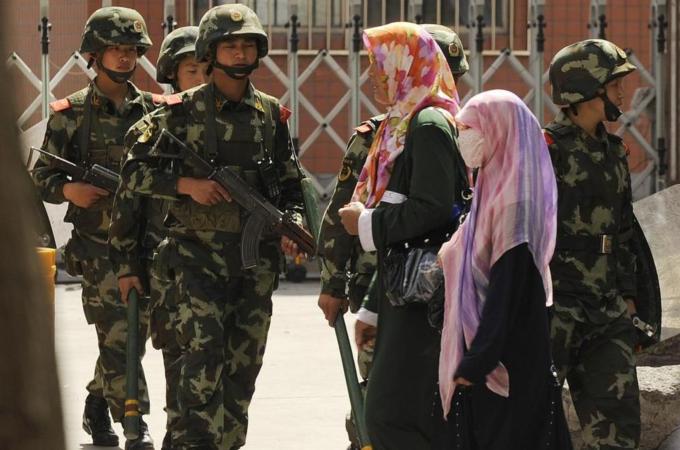Beijing’s nationwide “war on terrorism,” launched in response to mounting violence in Xinjiang and throughout China, has now been running for over two years. Amid the campaign, which has included increased security measures and legislation, several policies aimed at the predominately Muslim Uyghur ethnicity have been criticized by human rights activists and foreign diplomats for restricting religious freedoms in parts of Xinjiang: for example, the banning of headscarves and beards (with jail sentences for violators), state-ordered sale of alcohol and cigarettes in stores and restaurants, and calls for the “Sinicization of religion” in the region by top leadership. Ahead of Ramadan, an especially sensitive time in Xinjiang that has seen extended restrictions in recent years, Beijing has released a white paper extolling the religious freedom enjoyed in Xinjiang and the successes of the terror crackdown. From a Xinhua news release:
The white paper noted that normal religious activities in Xinjiang are protected by law, and religious organizations are responsible for coordinating internal religious affairs and the government should not interfere.
“No Xinjiang citizen has been punished because of his or her rightful religious belief,” read the white paper.
The document said those who have violated the legitimate rights and interests of religious organizations, venues for religious activities or clerical personnel or believers will bear due legal responsibilities, and those who have committed crimes will be held criminally responsible.
Judicial organs at all levels in Xinjiang combat criminal activities in the name of religion to better ensure the citizens’ freedom of religious belief and normal religious activities, said the white paper. [Source]
At The Wall Street Journal, Te-Ping Chen reports on the white paper as a defense to consistent criticism of the anti-terrorism campaign, and quotes human rights analysts and Xinjiang officials on the document:
The somewhat defensively couched phrasing comes after years of criticism by rights groups and foreign governments regarding China’s policies in the region, which is home to the mostly Muslim Uighur ethnic group. As the U.S. Commission on International Religious Freedom recently put it, Beijing’s efforts to fight terrorism have “led to a wide-scale crackdown on religious expression,” as well as hundreds or thousands of Uighurs seized in security sweeps and many prosecuted on charges of endangering state security.
[…] “Every ethnic group fully enjoys the right of freedom of religion and fully enjoys the happiness and serenity of religious and social harmony,” Shoket Imin, who sits on the standing committee of the party’s Xinjiang Uygur Autonomous Regional Committee, told reporters.
[…] While it was hard to tell what prompted this particular release, Maya Wang, researcher with the nonprofit Human Rights Watch, noted that it comes ahead of the anniversary of July 2009 violence in Urumqi, which officials said at the time left nearly 200 dead. The release also comes a week ahead of the start of Ramadan, a traditionally sensitive time in the region, given past strictures on its observance. […] [Source]
AP’s Gerry Shih reports that Xinjiang officials have promised that government interference will not obstruct observance of Ramadan this year:
Restaurants will be allowed to keep their own hours and authorized activities in mosques and private homes will be legally protected, the officials said at a news conference on religious policy in Xinjiang, despite complaints from rights groups and others of past government interference during the religious holiday.
Xinjiang is home to China’s Muslim Uighur minority group that is culturally, religiously and linguistically distinct from the Chinese majority. It has seen waves of violence against civilians in recent years which authorities have blamed on radicals seeking independence from Beijing.
China maintains tight restrictions over Islamic observances in the area, in part to maintain government control and stem the influence of radical Islam.
[…] However, human rights groups and Uighurs in exile say restrictions on dress, prayer and fasting during Ramadan have exacerbated ethnic tensions, while government efforts to assimilate Uighurs have stoked resentment. President Xi Jinping recently stated that members of the ruling Communist Party should be “unyielding Marxist atheists,” and the state imposes strict rules on participation in religious by students, teachers, public servants and others. [Source]
Reporting on the pledge for Reuters, Michael Martina notes that local officials in some parts of Xinjiang appear to have missed the memo:
“During the holy Islamic month of Ramadan, whether to close or open halal restaurants is completely determined by the owners themselves without interference,” a government report on religious freedom in Xinjiang said.
[…] Those pledges appeared to be at odds with some local policies.
Legal and religious officials in Khorgos city, near the border with Kazakhstan, in late May ordered inspections of more than 30 ethnic restaurant operators and had them “guarantee normal business during Ramadan”, a statement on the government’s website said.
An official at the Khorgos government publicity department told Reuters he could not comment. […] [Source]
On Friday, Ben Blanchard reported at Reuters, China’s Foreign Ministry expressed dissatisfaction with continued American concerns about the anti-terrorism campaign’s opacity:
China says the East Turkestan Islamic Movement (ETIM) is behind the unrest, though many experts have questioned whether ETIM exists as a cohesive militant group.
The U.S. State Department, in its annual report on terrorism around the world, said there was a lack of transparency or information from China about incidents Beijing called terrorism, and said counter-terrorism cooperation was limited.
Chinese Foreign Ministry spokeswoman Hua Chunying said China was “dissatisfied” with what she said were inaccurate remarks about China, and expressed regret at the “unobjective evaluation” of counter-terrorism cooperation.
“We cannot accept the United States issuing reports like this making thoughtless remarks about counter-terrorism policy in China and other countries,” she told a daily news briefing. [Source]








